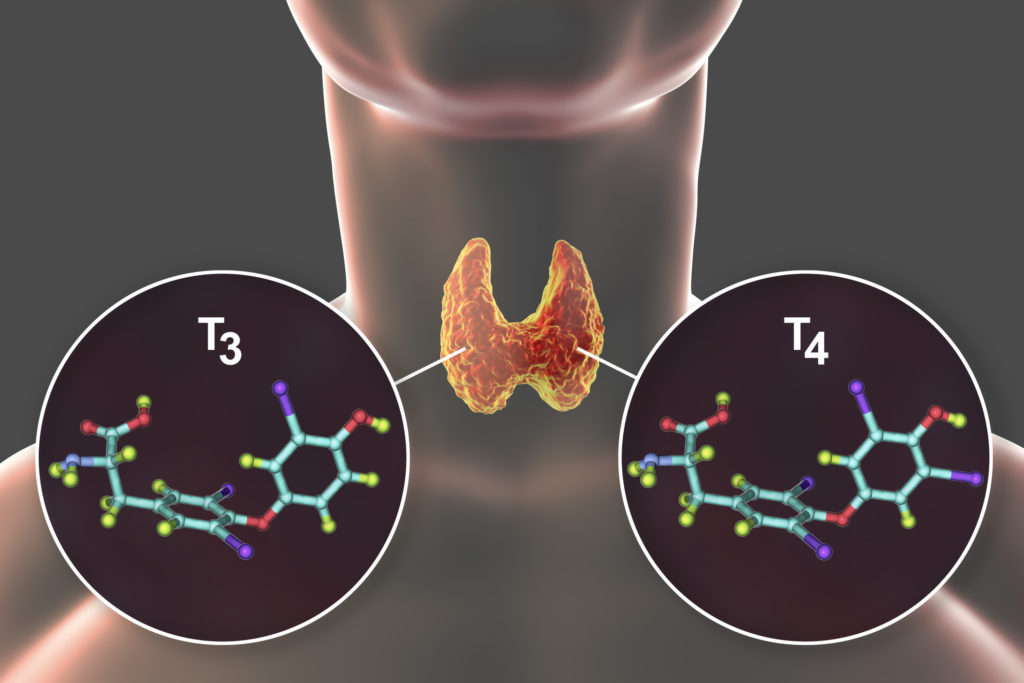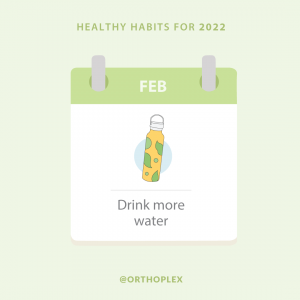
The thyroid is a butterfly-shaped gland that sits in the lower part of your neck. Its primary role is to produce the hormones thyroxine (T4), which is the inactive form, and triiodothyronine (T3), the active form. T4 is first produced by the thyroid, and then sent out into the body to be converted into T3.
T4 is first produced by the thyroid and then sent out into the body to be converted into T3.
Through these hormones, the thyroid then works to instruct and regulate important systems in your body. These include your body’s energy balance (regulating your weight), heat production (keeping your body temperature ideal) and nutrient metabolism (absorbing and processing the nutrients in your diet so your cells can use them).

So if the thyroid is so important, what happens when issues arise, and it can’t produce the right amount of thyroid hormones?
When balance becomes chaos
Triggered often by nutrient deficiencies, stress, infections, and even pregnancy, there are two main conditions associated with alterations to thyroid function:
- Hypothyroidism – when the thyroid produces less T3 and T4 than the body needs, leading to the body’s metabolic rate to slow. This is also referred to as an underactive thyroid.
- Hyperthyroidism – when the thyroid produces too much T3 and T4, stimulating and increasing the body’s metabolic rate above healthy levels. This is also referred to as an overactive thyroid.
While both conditions share some similarities in their presentations, there are also hallmark signs and symptoms that denote whether someone may suffer from one thyroid condition over the other. Examples of these symptom profiles include:
Hypothyroidism (underactive thyroid function)
- Unintentional weight gain, or hard to lose weight.
- Dry, flaky and/or thicker skin
- Hair loss and thinning, with loss of the last third of the eyebrows.
- Marked fatigue
- Cold
Hyperthyroidism (overactive thyroid function)
- Unintentional weight loss, or hard to put on weight
- Skin becomes warm, moist and/or itchy.
- Hair loss and thinning.
- Marked fatigue.
- Anxious and hot
However, while these symptoms can occur with an under and/or over active thyroid, they can also be symptoms of a myriad of other conditions. So before you go blaming your thyroid, I recommend seeking the advice of a Healthcare Practitioner, as they will be able to elucidate if your thyroid is the true cause of your symptoms. They also have access to an extensive thyroid testing to confirm this, plus a full suite of natural interventions to address the underlying cause, and support your thyroid directly.

Nutritional TLC
Some of the interventions used in correcting thyroid imbalances are key nutrients that the thyroid needs to create T3 and T4, and protect it from any damage that can occur if the body is inflamed or unwell. This foundational thyroid support is comprised of:
- Iodine: Thyroid hormones contain the mineral iodine as part of their chemical structure. If a person’s iodine intake is too low, the thyroid gland enlarges in an attempt to take up more from the blood (called a goitre), highlighting the importance of adequate iodine status in your body! Food sources include egg yolk, seaweed (ideal for sushi-lovers), oysters and scallops.
- Tyrosine: An amino acid, tyrosine is another structural component of thyroid hormones. It is therefore important to ensure you are eating enough each day from protein-rich foods, such as animal protein, legumes, nuts, seeds and soy protein.
- Selenium: This mineral is required to convert the inactive T4 into active T3. This conversion process also causes a natural level of oxidative stress within the thyroid gland, with selenium working to prevent this from damaging the thyroid tissue. Brazil nuts are a particularly rich source of this
If a person’s iodine intake is too low, the thyroid gland enlarges in an attempt to take up more from the blood (called a goitre), highlighting the importance of adequate iodine status in your body!
Time to Think About Your Thyroid?
Given the scope and impact that your thyroid has on the metabolic processes within your body, it should come as no surprise that dysfunction, whether over or under activity, will have a far-reaching impact to your health. If you’ve noticed changes in your weight, skin, hair and energy levels aligned with the list above, this may be a good time to talk with a Practitioner to evaluate whether your thyroid needs some extra care and attention.


 So Where Do You Stand?
So Where Do You Stand? Reducing toxin burden also means finding areas within your home or lifestyle that could increase your toxin exposure. For example, hormone disrupting chemicals (also referred to as endocrine disrupting chemicals or EDCs) can be found in plastics, synthetic skincare and make-up, unfiltered water, and home cleaning products, so should also be eliminated. Using your detox program as a time to switch over to natural alternatives is a fantastic opportunity to reduce your toxin burden ongoing, for lasting benefits beyond your detox program timeframe.
Reducing toxin burden also means finding areas within your home or lifestyle that could increase your toxin exposure. For example, hormone disrupting chemicals (also referred to as endocrine disrupting chemicals or EDCs) can be found in plastics, synthetic skincare and make-up, unfiltered water, and home cleaning products, so should also be eliminated. Using your detox program as a time to switch over to natural alternatives is a fantastic opportunity to reduce your toxin burden ongoing, for lasting benefits beyond your detox program timeframe. While you eliminate items increasing toxicity within the body, it’s important to also bolster your body’s capacity to detoxify.
While you eliminate items increasing toxicity within the body, it’s important to also bolster your body’s capacity to detoxify.

